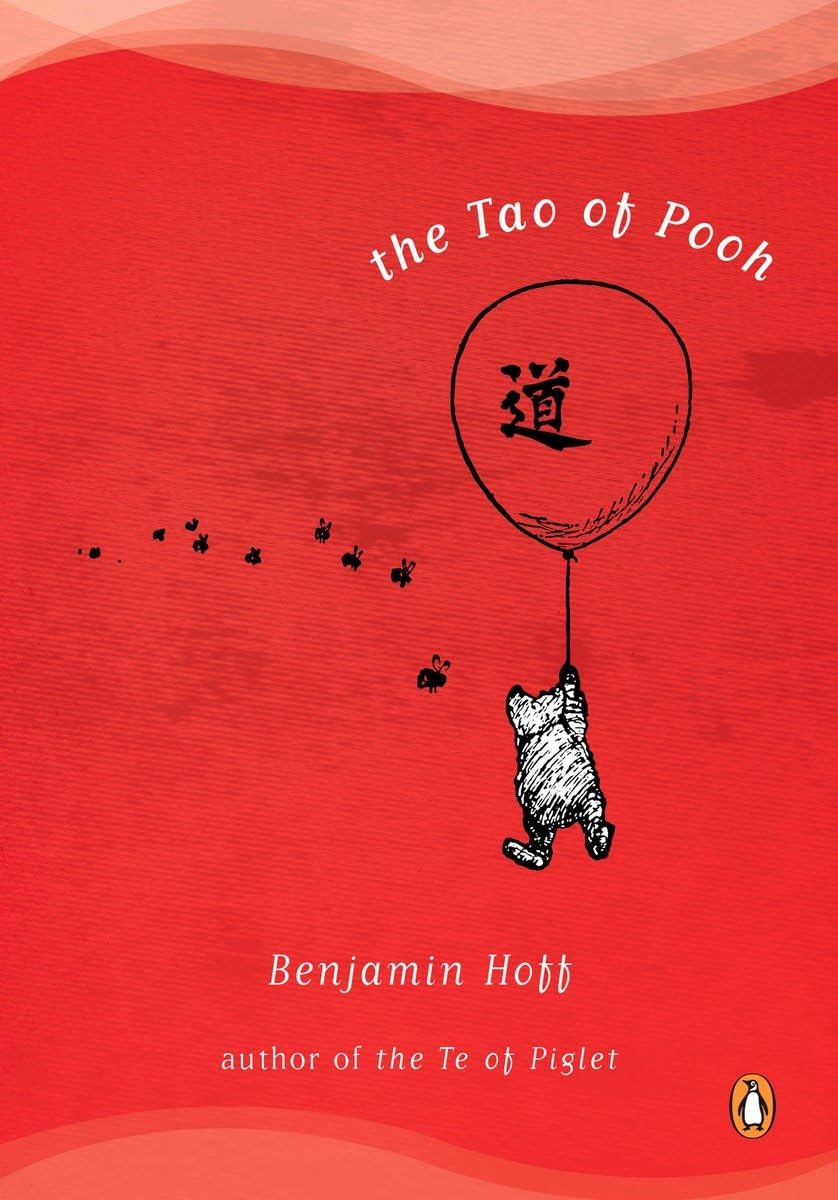
The Tao of Pooh
The Tao of Pooh by Benjamin Hoff is a charming and accessible exploration of Taoist philosophy through the beloved characters of A.A. Milne’s Winnie the Pooh.
By using Pooh’s simple, natural way of living as a guide, Hoff illustrates key Taoist principles such as effortless action (wu wei), simplicity, and living in harmony with the world.
Blending humor, storytelling, and wisdom, The Tao of Pooh offers readers a gentle invitation to slow down, embrace life’s flow, and find joy in being.
Description
- “The Tao of Pooh” by Benjamin Hoff uses the characters from A.A. Milne’s Winnie the Pooh stories to illustrate the principles of Taoism. Through Pooh’s simple, natural approach to life, Hoff explores concepts such as non-action (wu wei), living in harmony with the natural order, and embracing simplicity. The book aims to introduce Western readers to Taoist philosophy by demonstrating how these timeless ideas can lead to happiness and inner peace.
FAQs
- What is “The Tao of Pooh” about?
- • “The Tao of Pooh” by Benjamin Hoff uses the lovable characters from A.A. Milne’s Winnie-the-Pooh stories to explain the principles of Taoism. The book explores how Pooh and his friends embody various Taoist concepts, making ancient philosophy accessible and relatable.
- Who is the author of “The Tao of Pooh”?
- • The book was written by Benjamin Hoff, who is known for his works that introduce Eastern philosophy to Western audiences.
- How does “The Tao of Pooh” explain Taoism?
- • Hoff analyzes Taoist texts like Lao-tse’s Tao Te Ching and Chuang-tse’s writings, illustrating their principles through the behaviors and personalities of Winnie-the-Pooh and his friends.
- Is “The Tao of Pooh” suitable for readers unfamiliar with Taoism?
- • Yes, the book is designed to present Taoist ideas in a simple, engaging way, making it accessible to those new to the philosophy.
- What are some key principles of Taoism highlighted in the book?
- • The book emphasizes principles such as simplicity, living in harmony with nature, and effortless action (wu wei), as exemplified by Pooh’s relaxed and contented nature.
- Has “The Tao of Pooh” been well-received?
- • Yes, it was a bestseller and has resonated with many readers worldwide, inspiring a greater understanding of Taoism through its charming storytelling.
- Are there other related books by Benjamin Hoff?
- • Yes, Hoff has written other works like “The Te of Piglet,” which further explore Taoist themes through different characters.
- What makes “The Tao of Pooh” unique compared to other philosophical books?
- • Its use of beloved fictional characters and simple storytelling makes complex Taoist ideas easy to understand and enjoyable to read.
- Is “The Tao of Pooh” part of a series?
- • No, it is a standalone book, though Hoff has authored other related works that expand on Taoist principles using different characters.
- Where can I learn more about “The Tao of Pooh”?
- • You can find detailed summaries, study guides, and reviews on sites like LitCharts, BookBrief, and other literary resources that analyze its themes and teachings.
Quotes
- “Do you really want to be happy? You can begin by being appreciative of who you are and what you’ve got.” — Benjamin Hoff, The Tao of Pooh
- “The surest way to become Tense, Awkward, and Confused is to develop a mind that tries too hard—one that thinks too much.” — Benjamin Hoff
- “Wisdom, Happiness, and Courage are not waiting somewhere out beyond sight at the end of a straight line; they’re part of a continuous cycle that begins right here. They’re not only the ending, but the beginning as well.” — Benjamin Hoff
- “To know the way, we go the way, we do the way. The way we do, the things we do, it’s all there in front of you. But if you try too hard to see it, you may miss it.” — Benjamin Hoff
- “Pooh exemplifies the Uncarved Block — simple, natural, and in harmony with himself and the world. True wisdom often lies in simplicity.” — Paraphrased from The Tao of Pooh
- “The more that you read, the more things you will know. The more that you learn, the more places you’ll go.” — Benjamin Hoff (adapted from The Tao of Pooh)
- “Happiness depends upon ourselves, not on external circumstances.” — Benjamin Hoff
- “The way we do things, the choices we make, are all visible in our actions. If we try too hard to see the way, we may overlook the simple truth right in front of us.” — Paraphrased from the book’s themes
- “The wisdom of Pooh is not in knowing much but in understanding that living simply and naturally is the path to true contentment.” — Summarized from The Tao of Pooh
- “Developing a mind that thinks too much is the surest way to lose the peace that comes from living in harmony with oneself and nature.” — Benjamin Hoff
- Foreword 2,659 Words
- The How of Pooh? 2,630 Words
- The Tao of Who? 2,617 Words
- Spelling Tuesday 2,861 Words
- Cottleston Pie 2,578 Words
- The Pooh Way 2,243 Words
- Bisy Backson 2,514 Words
- That Sort of Bear 2,542 Words
- Nowhere and Nothing 2,630 Words
- The Now of Pooh 2,626 Words
- BACKWORD 2,159 Words
Quotes
“Do you really want to be happy? You can begin by being appreciative of who you are and what you’ve got.”
— Benjamin Hoff, The Tao of Pooh
“The surest way to become Tense, Awkward, and Confused is to develop a mind that tries too hard
— one that thinks too much.” — Benjamin Hoff
“Wisdom, Happiness, and Courage are not waiting somewhere out beyond sight at the end of a straight line; they’re part of a continuous cycle that begins right here. They’re not only the ending, but the beginning as well.”
— Benjamin Hoff
“To know the way, we go the way, we do the way. The way we do, the things we do, it’s all there in front of you. But if you try too hard to see it, you may miss it.”
— Benjamin Hoff
“Pooh exemplifies the Uncarved Block
— simple, natural, and in harmony with himself and the world. True wisdom often lies in simplicity.” — Paraphrased from The Tao of Pooh
“The more that you read, the more things you will know. The more that you learn, the more places you’ll go.”
— Benjamin Hoff (adapted from The Tao of Pooh)
“Happiness depends upon ourselves, not on external circumstances.”
— Benjamin Hoff
“The way we do things, the choices we make, are all visible in our actions. If we try too hard to see the way, we may overlook the simple truth right in front of us.”
— Paraphrased from the book’s themes
“The wisdom of Pooh is not in knowing much but in understanding that living simply and naturally is the path to true contentment.”
— Summarized from The Tao of Pooh
“Developing a mind that thinks too much is the surest way to lose the peace that comes from living in harmony with oneself and nature.”
— Benjamin Hoff
FAQs
What is “The Tao of Pooh” about?
• “The Tao of Pooh” by Benjamin Hoff uses the lovable characters from A.A. Milne’s Winnie-the-Pooh stories to explain the principles of Taoism. The book explores how Pooh and his friends embody various Taoist concepts, making ancient philosophy accessible and relatable.
Who is the author of “The Tao of Pooh”?
• The book was written by Benjamin Hoff, who is known for his works that introduce Eastern philosophy to Western audiences.
How does “The Tao of Pooh” explain Taoism?
• Hoff analyzes Taoist texts like Lao-tse’s Tao Te Ching and Chuang-tse’s writings, illustrating their principles through the behaviors and personalities of Winnie-the-Pooh and his friends.
Is “The Tao of Pooh” suitable for readers unfamiliar with Taoism?
• Yes, the book is designed to present Taoist ideas in a simple, engaging way, making it accessible to those new to the philosophy.
What are some key principles of Taoism highlighted in the book?
• The book emphasizes principles such as simplicity, living in harmony with nature, and effortless action (wu wei), as exemplified by Pooh’s relaxed and contented nature.
Has “The Tao of Pooh” been well-received?
• Yes, it was a bestseller and has resonated with many readers worldwide, inspiring a greater understanding of Taoism through its charming storytelling.
Are there other related books by Benjamin Hoff?
• Yes, Hoff has written other works like “The Te of Piglet,” which further explore Taoist themes through different characters.

